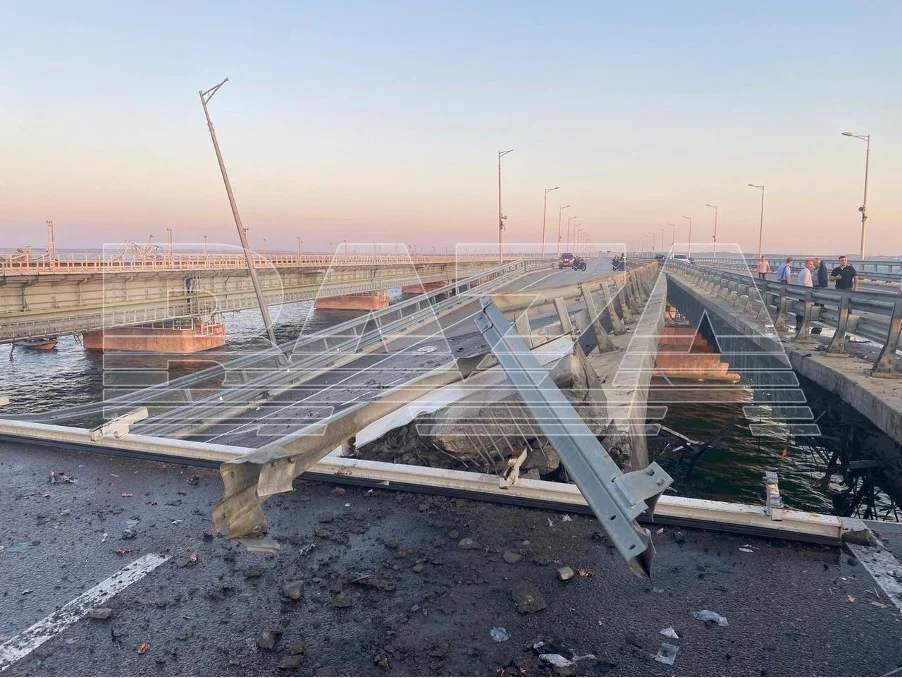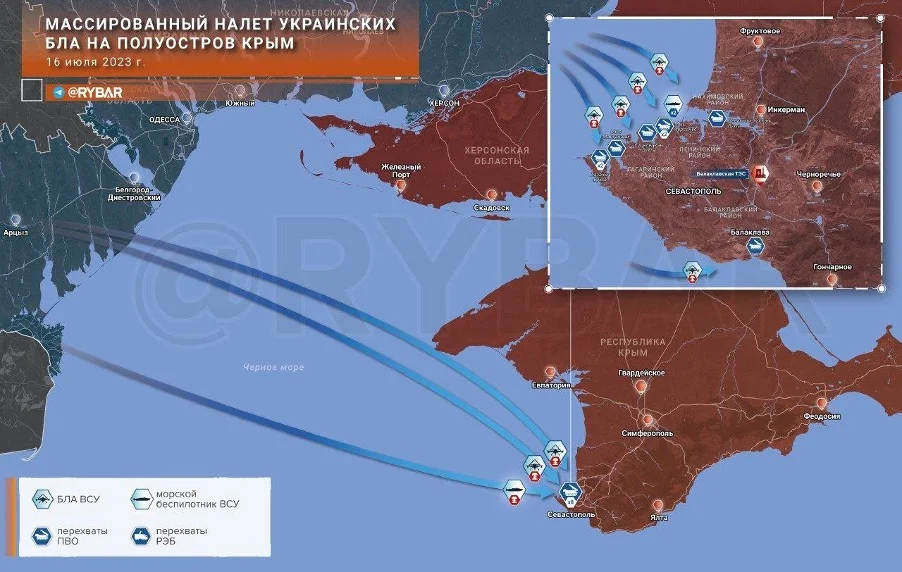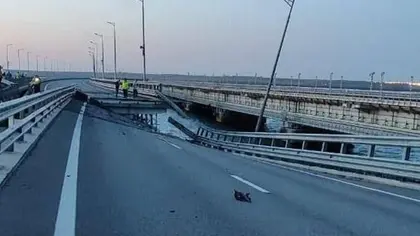Ukraine’s strategy of taking the fight to the Russian rear may have been on display from July 15 to 17 in occupied Crimea, after reports of a strike on the Kerch Bridge early this morning and an attack that possibly used Ukraine’s fleet of naval drones on the port of Sevastopol the previous day that put the peninsula on a state of emergency.
At around 3 a.m. July 17, two successive explosions were recorded on the Kerch Bridge, which connects Crimea with the Krasnodar region of Russia. Local residents reported that lights went out on some sections of the bridge followed by rising smoke.
Russian occupation officials in Crimea reported an “extraordinary event” had taken place on the bridge.
“Traffic has been stopped on the Crimean bridge: an extraordinary event has occurred in the area of the 145th support from the Krasnodar region. Law enforcement agencies and all relevant services are working,” Sergey Aksyonov, the Russia-installed governor of occupied Crimea, reported.
Aksyonov also asked travelers to not use the bridge and suggested alternative routes through occupied southern Ukraine.
Later on Monday morning, Russia officials said the attack killed a civilian couple and wounded their child.
"Two civilians died: a man and a woman, driving a car on the bridge," the Russian Investigative Committee said. "Their minor daughter was wounded."
A Ukrainian source told AFP that the Ukrainian Navy and SBU security service carried out the attack on the bridge.

N. Korean Troops Massed in Russia to Enter Ukraine War ’Soon’: Pentagon Chief
"Today's attack on the Crimean bridge is a special operation of the SBU and the navy," the security service source said.
The strike was carried out using waterborne drones, according to the same source.
The 19-kilometer bridge – a pet project of Russian President Vladimir Putin to connect mainland Russia with occupied Crimea – was at least temporarily closed earlier this morning, according to local residents and eyewitnesses, and major queues of vehicles were building up in Kerch.
The Russian news agency TASS and others reported that the movement of railway transport over the bridge was suspended.
Ferry services were also suspended and maritime navigation under the bridge was temporarily ceased.
Russian media outlet Baza reported that at least one section of the bridge had collapsed and posted inconclusive photos apparently from the scene. The Russian Ministry for Transport denied such a collapse.

Vyacheslav Gladkov, Governor of Russia’s Belgorod region, and other sources said on Telegram that a man and a woman died, and a 14-year-old girl was reportedly injured as a result of the explosions.
Russian Telegram channels speculated about the causes of the “extraordinary event,” including the possible use of naval drones.
“The drone strike was massive, so the result could have been much worse if not for the timely response of all responsible units,” one channel said.
Official Ukrainian spokespeople formally denied involvement in the event. Natalia Humeniuk, the spokeswoman for Ukraine’s southern military forces, put the blame back on Russia and labelled it a “possible provocation.”
Humeniuk indicated that it was a “typical method” used by Russia to gain some advantage, given the Black Sea Grain Initiative is due to expire today.
She further speculated that detouring travelers through occupied southern Ukraine may be aimed at “saturating these regions with civilians” prior to the advance of Ukrainian forces and to then “accuse [Ukraine] of wrongdoing in the framework of the war.”
Sevastopol is the main port of the Russian Black Sea fleet. Ships of that fleet have been widely used during Russia’s full-scale invasion of Ukraine to launch cruise missiles against Ukrainian civilian targets.
Russian milbloggers claimed that the drones were launched from Ukrainian air force and naval bases in the southwestern part of the Odesa region. They quickly posted illustrations and maps of the purported details of the operation.

At the time of publication, Russia claimed to have destroyed 10 of the aerial drones.
United24, the main fundraising platform of President Volodymyr Zelensky, has previously raised funds to build a 100-strong fleet of “multipurpose unmanned surface vehicles [which] are a unique Ukrainian development.”
United24’s website adds: “Drones can participate in long-range maritime reconnaissance and coastal surveillance, escorting and supporting the traditional fleet, convoying merchant ships, zoning in artillery fire, defending our bases and countering amphibious operations.”
In October 2022, the Kerch bridge – which is referred to as the Crimea bridge by Russian authorities – was damaged by an explosion in an attack that the Kremlin said was orchestrated by Ukrainian security forces. Ukraine admitted only indirectly to the attack months later.
The well-regarded Institute for the Study of War believes that the Kerch bridge has strategic importance as part of Ukraine’s counteroffensive.
“The Kerch Strait Bridge is a logistically significant object. Russia will only have one ground supply line – the coastal highway on the Sea of Azov – to sustain (or evacuate) its tens of thousands of troops in occupied Kherson and Crimea if Ukraine manages to degrade/destroy the bridge,” its analyst reported.
Since May and with an intensification in the last two weeks, Ukraine has been following a clear strategy of “shaping operations.”
Namely, using long-range weapons such as UK-provided Storm Shadow missiles and US-provided HIMARS rockets, as well as unmanned aerial vehicles (UAVs), it has been actively targeting Russian military and logistical assets and troop concentrations in the rear of Russian defensive lines in southern Ukraine.
You can also highlight the text and press Ctrl + Enter









